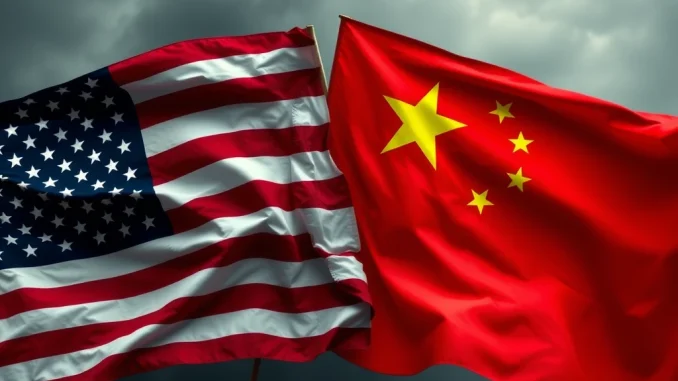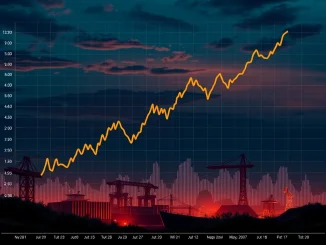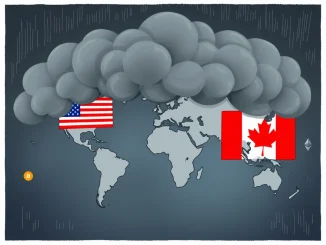
Hold onto your hats, crypto enthusiasts! The global stage is heating up, and it’s not just about blockchain innovations. A fresh report from CNN, relayed by market watcher Walter Bloomberg, reveals a tense behind-the-scenes drama: the United States has issued a private warning to China, urging them to avoid retaliating against potential new tariffs. This high-stakes standoff, centered around the looming threat of a US China trade war, could send ripples across all markets, including our beloved crypto sphere. Let’s dive into what’s unfolding and why it matters to your digital assets.
Why the Urgent Warning? Unpacking the US China Trade War Escalation
According to CNN’s report, the US isn’t just passively imposing tariffs; they’re actively trying to manage the fallout. The warning was a preemptive move, intended to discourage China from escalating the situation through economic retaliation. Think of it as a chess game where one player is trying to anticipate and neutralize the opponent’s counter-moves before they even happen.
- Private Channels: The warning wasn’t a public statement, but a discreet message delivered through diplomatic channels, indicating the sensitivity and urgency of the situation.
- Tariff Tensions: The core issue remains the ongoing trade disputes and the potential for increased tariffs, which act like taxes on imported goods, potentially raising prices and disrupting supply chains.
- De-escalation Strategy: By urging China to request a call between President Xi Jinping and President Donald Trump, the US is signaling a preference for dialogue and de-escalation over further conflict.
Economic Retaliation: The Ghost of Market Chaos
Why is everyone so concerned about economic retaliation? It’s simple: retaliation can trigger a spiral of escalating tariffs and trade barriers. Imagine a tit-for-tat scenario:
| Step | Action | Consequence |
|---|---|---|
| 1 | US imposes tariffs on Chinese goods. | Chinese goods become more expensive in the US. |
| 2 | China retaliates with tariffs on US goods. | US goods become more expensive in China. |
| 3 | US responds with further tariffs. | And so on… leading to a trade war. |
This cycle of retaliation can lead to:
- Slower Economic Growth: Trade wars disrupt global trade flows, impacting businesses and slowing down economic growth worldwide.
- Market Volatility: Uncertainty and fear surrounding trade disputes can trigger significant volatility in stock markets and, yes, cryptocurrency markets too.
- Supply Chain Disruptions: Businesses that rely on international supply chains face increased costs and potential disruptions, impacting profitability and consumer prices.
The Xi Trump Call: A Fragile Hope for Stability Amidst Global Market Uncertainty
The request for a Xi Trump call is the silver lining in this potentially stormy situation. Such a high-level conversation could be a crucial opportunity to:
- Establish Direct Dialogue: Direct communication between leaders can help clarify positions, reduce misunderstandings, and build trust.
- Negotiate and De-escalate: The call could pave the way for negotiations aimed at resolving trade disputes and preventing further escalation.
- Signal Stability: Even the announcement of a call can reassure markets and reduce immediate panic by suggesting that both sides are willing to engage in diplomacy.
However, it’s important to remember that a call is just the first step. The outcome is far from guaranteed, and the situation remains highly fluid. The global market uncertainty stemming from these geopolitical tensions is palpable, and investors are watching closely.
Crypto’s Role in Times of Global Economic Tremors
So, how does all of this relate to crypto? In times of global market uncertainty, cryptocurrencies are often viewed as alternative assets, sometimes referred to as “safe havens” or uncorrelated investments. While the reality is more nuanced and crypto markets are also susceptible to volatility, major global economic events can influence investor sentiment and capital flows.
Here’s how the US-China trade situation could indirectly impact the crypto market:
- Risk-Off Sentiment: If the trade tensions escalate and traditional markets (stocks, bonds) become more volatile, some investors might seek refuge in assets perceived as less correlated, including cryptocurrencies like Bitcoin.
- Inflation Concerns: Tariffs can contribute to inflation by raising import costs. In inflationary environments, some investors may turn to Bitcoin as a hedge against inflation, given its limited supply.
- Geopolitical Uncertainty Premium: Heightened geopolitical risk can increase the appeal of decentralized and borderless assets like cryptocurrencies.
The Takeaway: Stay Informed, Stay Vigilant
The US-China trade situation is a developing story with potentially significant implications for the global economy and, by extension, the cryptocurrency market. While the immediate impact on crypto might not be direct, the broader economic climate and investor sentiment are crucial factors to consider.
As a crypto enthusiast, staying informed about these global events is just as important as tracking the latest DeFi protocol or NFT drop. Keep an eye on news from reliable sources like CNN and market analysts like Walter Bloomberg. Volatility might be on the horizon, but with knowledge and a strategic approach, you can navigate these uncertain times in the crypto world. The potential Xi-Trump call is a key event to watch – it could be a turning point towards de-escalation or just the beginning of a longer, more turbulent ride. Stay tuned!



